|
|
|
Sort Order |
|
|
|
Items / Page
|
|
|
|
|
|
|
| Srl | Item |
| 1 |
ID:
031952
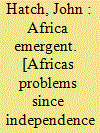

|
|
|
|
|
| Publication |
London, Secker and Warburg, 1974.
|
| Description |
ix, 233p.hbk
|
| Standard Number |
436191261
|
|
|
|
|
|
|
|
|
|
|
|
Copies: C:1/I:0,R:0,Q:0
Circulation
| Accession# | Call# | Current Location | Status | Policy | Location |
| 014981 | 960.326/HAT 014981 | Main | On Shelf | General | |
|
|
|
|
| 2 |
ID:
147369
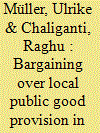

|
|
|
|
|
| Summary/Abstract |
In rural India, decentralized government schemes and assembly constituency development programs represent major channels through which local public good provision is realized. This polycentric governance structure confronts local leaders with a distributional conflict, which is nested in a social dilemma situation. Based on a controlled case study approach, we investigate the provision of small-scale infrastructure in three South Indian communities. Apart from roads and drinking water facilities that directly appeal to the residents of a community, local leaders bargain over infrastructure contracts, which serve as patronage resources in interactions with politicians from higher government levels. A comparative game-theoretic analysis of the results suggests that coordination through political party identities has translated into alternative bargaining strategies and hence varying distributional outcomes regarding contracts and local public goods in the communities under review. The study concludes with recommendations for polycentric institutional design.
|
|
|
|
|
|
|
|
|
|
|
|
|
|
|
|
| 3 |
ID:
120643
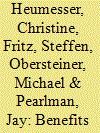

|
|
|
|
|
| Publication |
2012.
|
| Summary/Abstract |
The vision of the Global Earth Observation System of Systems (GEOSS) is the achievement of societal benefits through voluntary contribution and sharing of data, metadata and products at no or minimum cost. Such undertakings, where contribution provides positive externalities, benefiting contributors and non-contributors alike, are often described as 'social dilemmas', usually resulting in small levels of voluntary contribution. We investigate the benefits and challenges of voluntary contribution to GEOSS, surveying economic and game theoretic literature and examining how the concepts of social dilemmas apply to the provision of GEOSS. We conduct an exploratory survey among individuals involved in the Group on Earth Observation (GEO) to understand their perception of voluntarily contribution. Even though contribution to GEOSS was perceived as rather low, e.g. because of a perceived lack of funds, commitment or organization, survey respondents also perceived many (exclusive) benefits of contribution, e.g. networking, visibility for their work or collaborating with motivated individuals. To increase participation, respondents suggested increasing financial support and raising awareness of GEOSS. We conclude that communicating the efficacy of individuals' contributions, the personal benefits of contribution and strengthening of group identity and knowledge about fellow participants' work can constitute incentives for future voluntary contribution. This could be facilitated by an externally established institution providing a framework for cooperation, or by institutions, agreements or frameworks agreed upon by contributors themselves.
|
|
|
|
|
|
|
|
|
|
|
|
|
|
|
|
| 4 |
ID:
155303
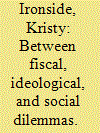

|
|
|
|
|
| Summary/Abstract |
This article examines the ‘tax on bachelors, singles, and small families of the USSR’. The tax was introduced in 1941 to boost the birth rate and expanded in 1944 to finance the state’s benefits offered to mothers and children. The Ministry of Finance eventually moved away from its support for the regressive and inefficient bachelor tax and explored other tax-based strategies to boost the birth rate and support families. However, it was constrained in its reform efforts, both by Khrushchev and by ideas about the appropriate role of taxes as the Soviet Union progressed away from crisis and towards communism.
|
|
|
|
|
|
|
|
|
|
|
|
|
|
|
|
| 5 |
ID:
093682
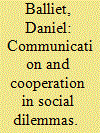

|
|
|
|
|
| Publication |
2010.
|
| Summary/Abstract |
Among the most researched solutions to social dilemmas is communication. Since the late 1950s, it has been well known that communication enhances cooperation in social dilemmas. This article reports a meta-analysis of this literature (forty-five effect sizes) and finds a large positive effect of communication on cooperation in social dilemmas (d = 1.01). This effect is moderated by the type of communication, with a stronger effect of face-to-face discussion ( d = 1.21) compared to written messages (d = 0.46). The communication-cooperation relationship is also stronger in larger, compared to smaller, group social dilemmas. Whether communication occurred before or during iterated dilemmas did not statistically affect the communication-cooperation effect size. Results are discussed according to theory and research on communication in social dilemmas.
|
|
|
|
|
|
|
|
|
|
|
|
|
|
|
|
| 6 |
ID:
084032
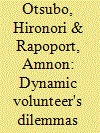

|
|
|
|
|
| Publication |
2008.
|
| Summary/Abstract |
Volunteer's dilemmas that evolve over time are presented and modeled as noncooperative n-person games in extensive form with symmetric players, discrete time, finite horizon, and complete information. Volunteering is costly, thereby giving rise to free riding. Reflecting on the observation that in many naturally occurring social dilemmas it is beneficial to volunteer earlier than later, the model assumes that the payoff to the volunteer and the (higher) payoff to each of the nonvolunteers decrease monotonically over time. The authors construct symmetric and asymmetric subgame perfect equilibria to the game. An experimental study shows that financially motivated subjects who are rewarded contingent on their performance volunteer more readily when the cost of volunteering is relatively low; that they largely fail to coordinate on any of the asymmetric equilibria in which only a single subject volunteers immediately; that they volunteer, on average, earlier than predicted; and that they vary considerably from one another in their inclination to free ride.
|
|
|
|
|
|
|
|
|
|
|
|
|
|
|
|
| 7 |
ID:
142047
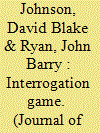

|
|
|
|
|
| Summary/Abstract |
While there is widespread debate about techniques for obtaining information from non-cooperative sources, there is little research concerning the efficacy of different methods. We introduce the ‘Interrogation Game’ as a simple model of the information a source will provide when faced with either (1) an interrogator using coercive techniques or (2) an interrogator offering rewards. The model demonstrates that coercive interrogation results in a very slight increase in accurate information from knowledgeable sources, but much more inaccurate information from ignorant sources. In short, when ignorant group members refuse to provide information, this increases the inequality of payoffs among group members under coercion while the same behavior – truthfully revealing ignorance – decreases the inequality of payoffs under reward. If ignorant detainees have concern for the payoffs of their other group members, they will admit their ignorance in reward, but not coercion. We test the model with a group-based experiment. As the model predicts, coercion leads subjects to provide more inaccurate information. Contrary to the model’s expectations, however, accurate information is almost equally likely in the coercion and reward treatments.
|
|
|
|
|
|
|
|
|
|
|
|
|
|
|
|
| 8 |
ID:
145989
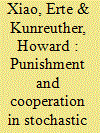

|
|
|
|
|
| Summary/Abstract |
Previous findings on punishment have focused on deterministic environments in which the outcomes are known with certainty. In this article, we conduct experiments to investigate how punishment affects cooperation in stochastic social dilemmas where each person can decide whether to cooperate, when the outcomes of alternative strategies are specified probabilistically. Two types of punishment mechanisms are studied: (1) an unrestricted punishment mechanism—both persons can punish—and (2) a restricted punishment mechanism—only cooperators can punish noncooperators. We compare behavior in a two-person deterministic prisoner’s dilemma game (DPD) with a two-person stochastic prisoner’s dilemma (SPD). In all treatments, participants are given information on the other person’s actions. We find that in both games, the restricted punishment mechanism promotes more cooperative behavior than unrestricted punishment. However, the difference in the degree of effectiveness between the two mechanisms is smaller in the SPD game than in the DPD game because noncooperative behavior is less likely to be punished when there is outcome uncertainty. Our findings provide useful information for designing efficient incentive mechanisms to induce cooperation in a stochastic social dilemma environment.
|
|
|
|
|
|
|
|
|
|
|
|
|
|
|
|
| 9 |
ID:
073760
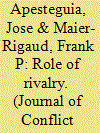

|
|
|
|
|
| Publication |
2006.
|
| Summary/Abstract |
Despite a large theoretical and empirical literature on public goods and common-pool resources, a systematic comparison of these two types of social dilemmas is lacking. In fact, there is some confusion about these two types of dilemma situations. As a result, they are often treated alike. In line with the theoretical literature, the authors argue that the degree of rivalry is the fundamental difference between the two games. Furthermore, they experimentally study behavior in a quadratic public good and a quadratic common-pool resource game with identical Pareto-optimum but divergent interior Nash equilibria. The results show that participants clearly perceive the differences in rivalry. Aggregate behavior in both games starts relatively close to Pareto efficiency and converges quickly to the respective Nash equilibrium.
|
|
|
|
|
|
|
|
|
|
|
|
|
|
|
|
|
|
|
|
|